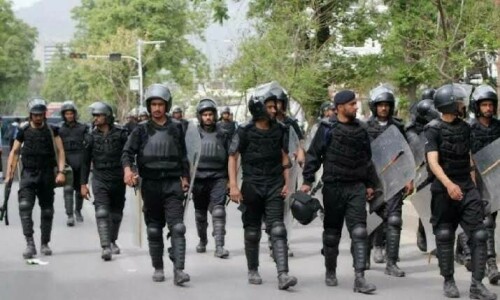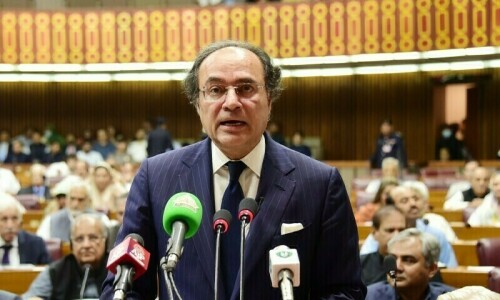KARACHI: “There is a colonial pattern of control visible in Balochistan which has resulted in the largest province of Pakistan not only lagging behind, but falling further behind,” said Dr Kaiser Bengali, economist and former adviser to the Balochistan chief minister, at the Arts Council here on Tuesday.
He was speaking at the launch of his book A Cry for Justice, a publication that aims to provide empirical insights from Balochistan while he was working there.
Divided into five chapters, the book sheds light on different aspects such as gas, development funding, and civil services in Balochistan and Dr Bengali’s observations state that “Balochistan is being discriminated against in a systematic way and on a large scale resources are being taken from the province and used in other provinces.”
Gas was discovered in 1952 in Sui, and from 1955 it was supplied in the pipelines, he said. However, Balochistan was first supplied with gas in 1984, he said, before which the province had no gas. The production of gas in the province has also dropped significantly. One of the reasons is that the reserves in Sui have dwindled.
Kaiser Bengali’s A Cry for Justice launched
“In 10 years Sui will be finished. Sui town will become a ghost town. What will happen to those who have made homes there, who have invested their savings to build homes there? We have taken Balochistan’s gas and supplied it to Karachi, Lahore, Gujranwala, Sialkot to make industries, have used gas at nominal rates and now Balochistan’s Sui will die soon,” he said.
Dr Bengali also spoke about the state of development in the province. “All studies conducted from 1982 about the district ranking in Pakistan have shown that the bottom half, or one-third districts, were from Balochistan, with the exception of Quetta. In a 2001 study, 24 out of 26 districts in Balochistan are in high deprivation capacity, which means 88 per cent of the population of Balochistan are in high deprivation category. This means there are hardly any income opportunities, infrastructure is lacking and so is education, among others. There is also no water to drink.”
With regards to housing in Balochistan, Dr Bengali said that from 1990 to 2016, “not one single scheme has been made for civilian housing. Till 2010 this came under the federal government and they did not make even one housing scheme in Balochistan. In fact, from 2012 till 2016, all residential and office construction has been for security agencies and federal civil administration.”
Neglect with regards to road networks is also rampant in the province, said Dr Bengali. “Till 2004, 46 years after Gwadar’s inclusion in Pakistan, residents of Gwadar and coastal towns travelled to Karachi via a dirt track. A 100,000 square-kilometre area in central Balochistan was devoid of any metalled road. It was Balochistan’s Empty Quarter, akin to the Arabian Peninsula’s Rub al-Khali.”
Till a year ago, he said, there was no direct road between Gwadar and Quetta, and even today there is not a single dual carriage way in the province. All these, said Dr Bengali, have resulted in many road disasters. Even in the bureaucracy a similar trend is seen; the presence of Balochistanis in the corridors of power is scant at best.
What can be done in the case of Balochistan is to start giving it back, said Dr Bengali. “How can Balochistan be rich in natural resources yet abjectly poor? This is due to a saga of resource transfer on a massive scale, a saga of colonial-style political and economic management.”
Serious reforms, Dr Bengali suggested, include “tripling the unit price of gas, correct discriminatory distortions in civil service rules, amend electoral regime to suit Balochistan’s conditions, and enhance the province’s share in BISP to 10pc.”
According to Dr Bengali, the total resource transfer from Balochistan from 1965 to 2014 is of almost Rs7 trillion. “Thus there is a need to create a 20-year Rs7tr development fund for the province. We must allocate 44pc of the NHA budget for Balochistan for 20 years.”
Published in Dawn, February 28th, 2018














































